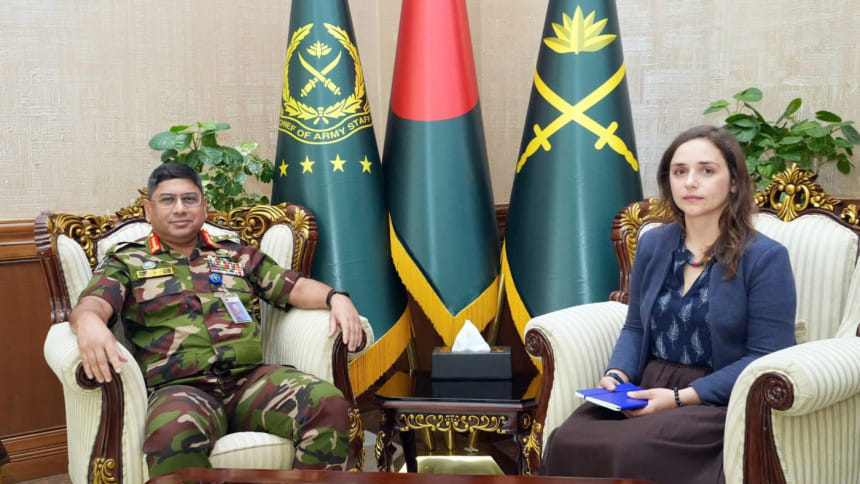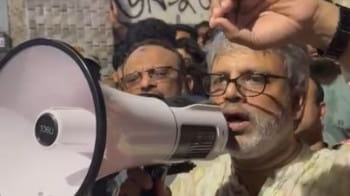Enforced disappearances: Govt to form commission, enact law

The government has decided to form a permanent commission and enact a law within a month to prevent incidents of enforced disappearance in the future.
Law Adviser Asif Nazrul disclosed the matter to journalists after a meeting with a delegation from the UN Working Group on Enforced or Involuntary Disappearances at the Secretariat yesterday.
"One of the interim government's commitments was to investigate and prosecute cases of enforced disappearances. We met the UN working group today. They praised some of our activities. They also hailed the initiative to enact the law."
The delegation from the UN working group, comprising its Vice-Chairperson Grazyna Baranowska, and member Ana Lorena Delgadillo Perez, began a four-day visit to Bangladesh on Sunday.
On the first day of the visit, the delegation, for consultation, visited human rights advocates and UN officials in Dhaka. Yesterday, it also met Chief Adviser Prof Muhammad Yunus, Army Chief General Waker-Uz-Zaman, and representatives from Maayer Daak, a platform for family members of victims of enforced disappearances.
Acting foreign secretary Ruhul Alam Siddique and the Chief Prosecutor of the International Crimes Tribunal (ICT) Tajul Islam were also visited by the delegation.
"I wish the United Nations were associated with our ongoing inquiry into the incidents of enforced disappearance. It will give the process some strength," said Prof Yunus when Baranowska and Perez called on him at the State Guest House Jamuna, according to a press release.
The UN officials lauded the initiatives of Bangladesh's interim government in addressing the issue of enforced disappearances, particularly the country's accession to the International Convention for the Protection of All Persons from Enforced Disappearance (ICPPED), but emphasised that there was still much to be done.
The UN officials also praised the work and commitment demonstrated by the Commission of Inquiry on Enforced Disappearances.
The chief adviser expressed his satisfaction that Bangladesh could welcome the UN team here after more than a decade.
"We are extremely happy that you're here after 13 years of waiting. We would like you to support the work of our commission and ... provide guidance and strength."
Baranowska said since 2013, they had been trying to work on enforced disappearance in Bangladesh and thanked the interim government for setting up the inquiry commission.
Baranowska said they would go outside Dhaka and hold meetings with victims, civil society, and political actors.
Meanwhile in the capital's Gulshan, the UN working group, the UN Resident Coordinator Office, and Maayer Daak jointly organised a half-day discussion.
The event brought together over 80 family members of the disappeared, survivors of secret detentions, and international experts working on enforced disappearances, said a press release.
Victim families who have spent years searching for justice and answers shared deeply personal testimonies of trauma, loss, and resilience.
According to rights body Odhikar, at least 708 people were victims of enforced disappearance between 2009 and June 2024.
Families and survivors urged the UN working group to take an active role in conducting a comprehensive fact-finding mission on enforced disappearances in Bangladesh.
They also raised serious concerns about the impartiality and effectiveness of the current inquiry, especially given the destruction of evidence at detention sites and the troubling lack of access to the commission's findings.
During the courtesy call on General Waker at the Army Headquarters, Baranowska expressed concern over allegations raised against a few army personnel who had previously served (in deputation) in various organisations, including the Rab, DGFI, and BGB.
In response, the army chief clarified that such personnel remain under the full command and administrative control of the respective organisations during their deputation, according to an army notification.
The army chief also reaffirmed that the Bangladesh Army is committed to upholding justice and the protection of human rights and continues to extend full cooperation to national and international investigative processes, the notification added.
Meanwhile, the UN delegation discussed the ongoing efforts and challenges surrounding the prosecution of enforced disappearance cases when it met the ICT Chief Prosecutor Tajul Islam.
"They wanted to understand how we handle cases of enforced disappearance, the current status of investigations and trials, the challenges we face, and the support we need," Tajul told journalists after the meeting at his office.
Tajul added that the UN team assured them of full support and cooperation to ensure justice for victims.
"There are multiple issues at play, particularly ensuring the safety of victims and witnesses who come forward to testify. We discussed how the UN could assist us in those areas."
He emphasised that witness protection remains a critical concern.
"Although laws exist, implementing them effectively remains a challenge. In some cases, witnesses may need to be relocated for their safety, even abroad -- something the government alone cannot ensure. UN support is essential in this regard."
The delegation also enquired about the logistical capacity of the ICT to reach victims who are unwilling or unable to approach the tribunal.
In response, Tajul proposed establishing outreach centres under the ICT's investigation agency in various regions to reach victims more effectively, a move he said would also require UN assistance.

 For all latest news, follow The Daily Star's Google News channel.
For all latest news, follow The Daily Star's Google News channel. 



Comments